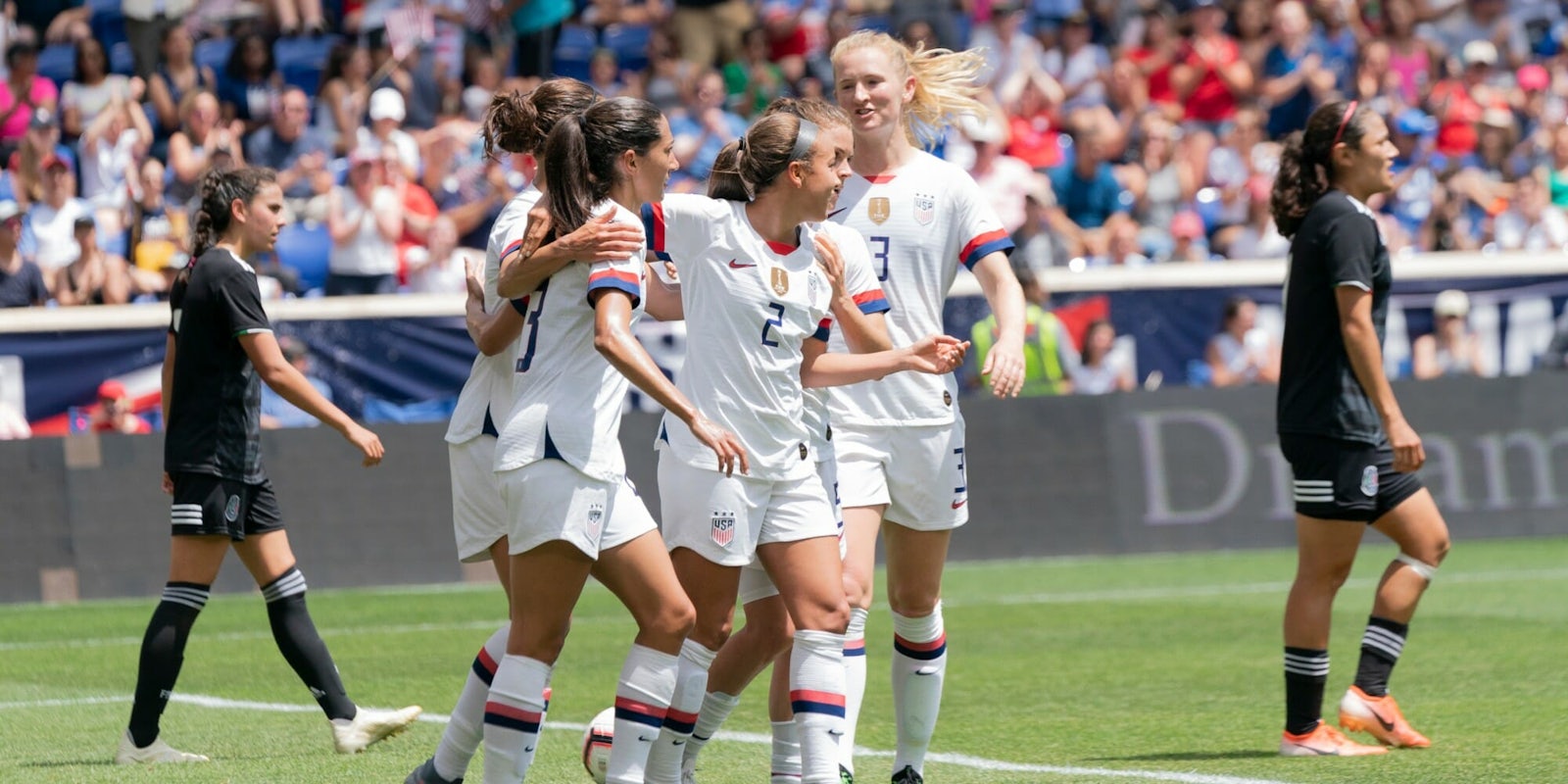Starting June 7 and running a full month—until the July 7 finals in Lyon—the 2019 FIFA Women’s World Cup is the quadrennial soccer tournament featuring the world’s best women’s soccer teams. The United States, who emphatically won the 2015 edition of the tournament hosted by Canada, face challenging competition in their title defense. They do have an immensely talented team, especially in attack and midfield, and most of the players have prior World Cup experience, but there are some questions about their defensive depth and how they measure up against some of the contenders.
Here’s everything you need to know to watch the 2019 FIFA Women’s World Cup.
What is the FIFA Women’s World Cup?
Only around since 1991, the tournament’s inaugural edition was held in China and won by the U.S. The 1995 edition in Sweden was won by neighboring Norway, the 1999 edition was held in the U.S. and famously won by the hosts. (You might remember the dramatic penalty shootout against China to cap off the successful tournament run.) While Germany and Japan won World Cups leading up to the 2015 edition, the U.S. has never finished lower than third place.
The Women’s World Cup is organized like the U-20 World Cup currently taking place in Poland: Six groups of four teams each compete in the group stage, and then the winners and second place teams in each group advance to the knockout rounds, along with the top four of six third-place teams in each group. Those 16 teams face off in win-or-go-home matches, halving the field with each round leading to the July 7 final.
Which Women’s World Cup teams should you know?
Let’s start with the three-time champion Americans. If you watched the 2015 edition of the tournament, you’ll recognize names like Carli Lloyd (currently in a super-sub role), Alex Morgan (typically the starting center forward), Megan Rapinoe (a seasoned midfielder known for her pinpoint passes), Julie Ertz (Julie Johnston during the 2015 edition, a steady defensive midfield presence), and Ali Krieger (who has played 100 times for the U.S. women as a defensive anchor). The team also has some players new to the World Cup but not the USWNT. Look for players like Crystal Dunn and Mallory Pugh to impress with their pace and poise, starting goalkeeper Alyssa Naeher to stop shots with authority, and six-footer Samantha Mewis to be a secret weapon; in recent qualifying matches, she’s been one of the team’s main scoring threats through her tenacity.
Germany, England, and France round out the world’s Top 4, and the growth of the women’s game worldwide has allowed their talented squads to gain valuable experience for club as well as country. The USWNT’s historic border rival, Canada, includes a number of players who play professionally in the U.S., including the legendary Christine Sinclair, approaching 300 international starts and 200 international goals and starring for the NWSL’s Portland Thorns. Another living legend, Marta, anchors a talented Brazil team while playing her club soccer with the Orlando Pride alongside Morgan, Krieger, and USWNT goalkeeper Ashlyn Harris.
When does the USWNT play?
The USWNT will play Tuesday, June 11 at 3pm ET against Thailand, Sunday, June 16 at noon ET against Chile, and Thursday, June 20 at 3 pm ET against Sweden. Assuming they advance past the group stages, their initial knockout round match will be Monday, June 24 (or, in the unlikely event that they fall to third in the group, Tuesday, June 25).
FIFA Women’s World Cup channels
Games will be broadcast on Fox, FS1, and FS2.
FIFA Women’s World Cup live stream: Watch FIFA Women’s World Cup matches for free
Each of the following services carry Fox, FS1, and FS2 and provide a one-week trial and therefore an easy way to watch FIFA U-20 World Cup matches for free. (Telemundo will handle Spanish coverage for American audiences.)
1) FuboTV
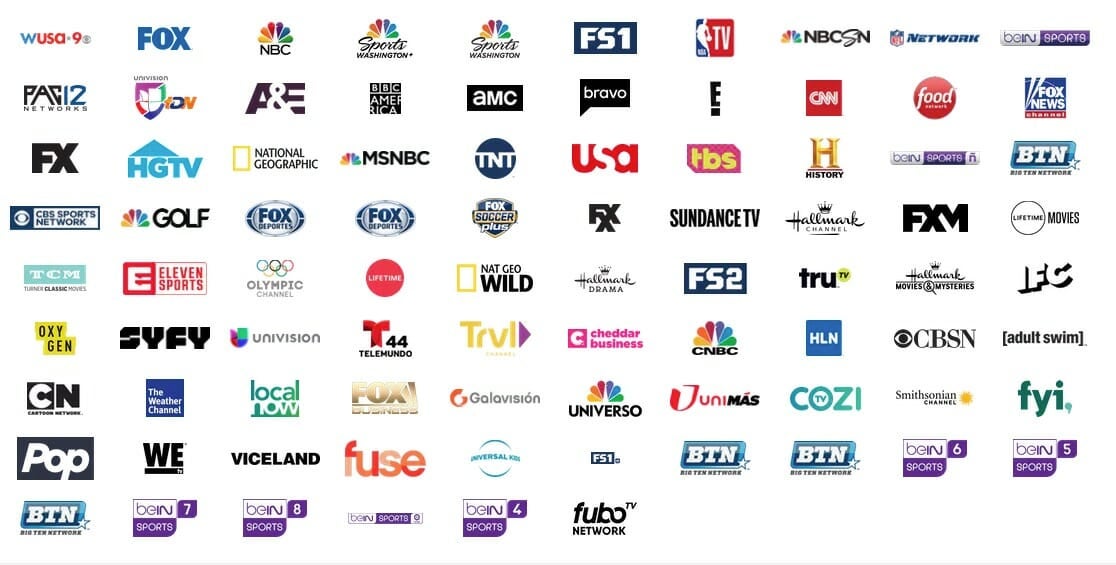
- Cost: $44.99 for the first month, $54.99 per month thereafter (40% off first month)
- FuboTV devices: Roku, Apple TV, Amazon Fire Stick and Fire TV, Android TV, iOS and Android devices
- FuboTV local channels: Fox, NBC, CBS (check local availability here)
FuboTV is a solid TV streaming service option, whether your tastes run to entertainment (AMC, Syfy, FX), news (MSNBC, CNN), or sports (NBA TV, NFL Network). If you’re a soccer fan, however, it will appear tailor-made for you, with 10 beIN SPORTS channels, NBCSN, FS1, FS2, UniMás, and Champions League actions via TNT all on tap. And for the Women’s World Cup, it’s especially strong, promising to stream each match in 4K. If you can’t watch a match live, FuboTV offers a three-day replay for each match and 30 hours of cloud DVR. (Check out the complete FuboTV channels list.)
FuboTV also has bilingual families in mind; each subscription comes with UniMás, Galavisión, NBC Universo, beIN SPORTS, Univision, and Fox Deportes. An extra $7.99 per month will bring you Latino Plus, which includes CNN en Español and TyC Sports among its offerings.
2) Sling TV
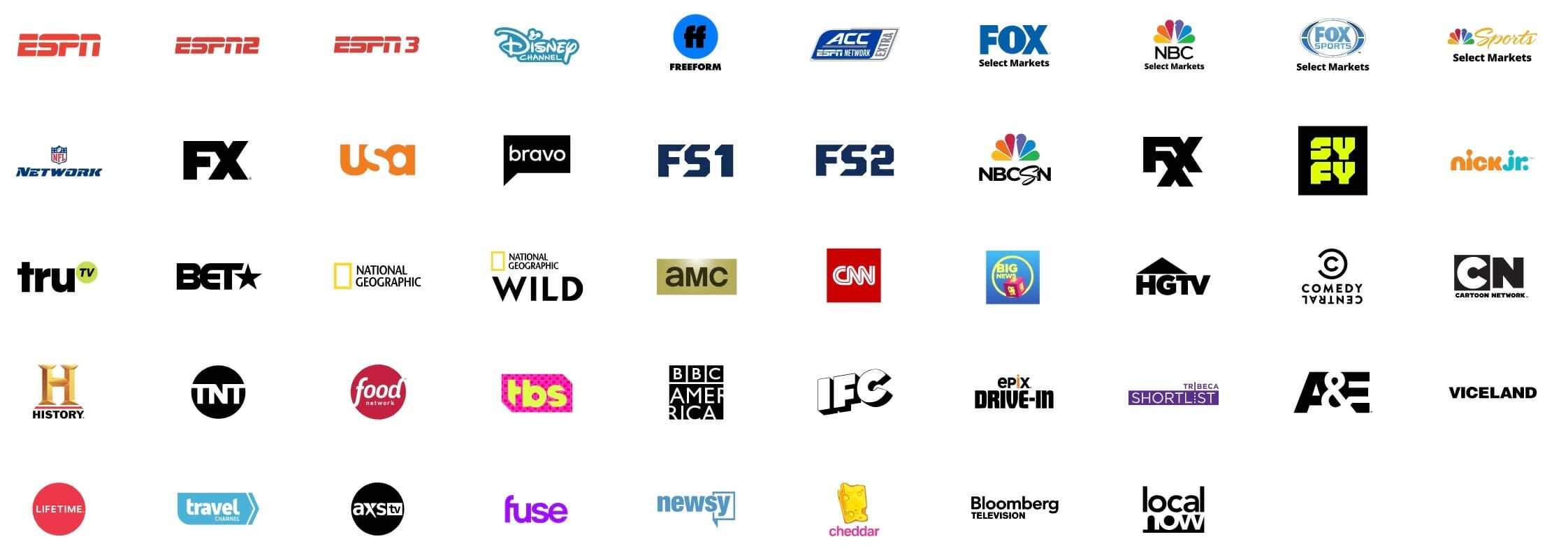
- Sling TV pricing: $25-$40 per month (after a 7-day free trial)
- Sling TV devices: Amazon Fire Stick and Fire TV, Apple TV, Android TV, Roku, Xbox One, Google Chromecast, Oculus Go, Microsoft Edge, and iOS and Android devices
- Sling TV local channels: NBC, Fox (check your local availability here)
Sling TV provides two base channel package options, each priced at $25 per month. Sling Orange includes three ESPN channels, while Sling Blue includes sports channels like NFL Network, FS1 and FS2 (where much of the Women’s World Cup action will be), NBCSN, and local channels. If you’re Team “Why Not Both,” Sling Orange + Blue combines the two for just $40 per month. To add beIN SPORTS and maximize your soccer-watching potential, you’ll want to add either Sports Extra: Sling Orange ($5 per month) or Sports Extra: Sling Blue ($10 per month). (The latter also includes NFL RedZone.)
Spanish-speaking viewers have quite a few options. For bilingual families, you might consider the Español: Best of Spanish TV package for either Sling Orange or Sling Blue for 24/7 specialty channel LaLiga TV and beIN SPORTS Connect: Channels 4-9, which features matches from LaLiga, Ligue 1 and Copa del Rey, among others. Both packages cost $5 per month after your free trial. Sling TV Latino is another Spanish-language package for $10 per month, including NBC Universo, History en Español, and—of import to soccer fans—four beIN SPORTS channels. (And choosing Sling TV Latino + Sling Orange for $30 per month gives you access to ESPN Deportes.) For more information, check out our guide to Sling TV channels and our Sling TV review.
3) PlayStation Vue
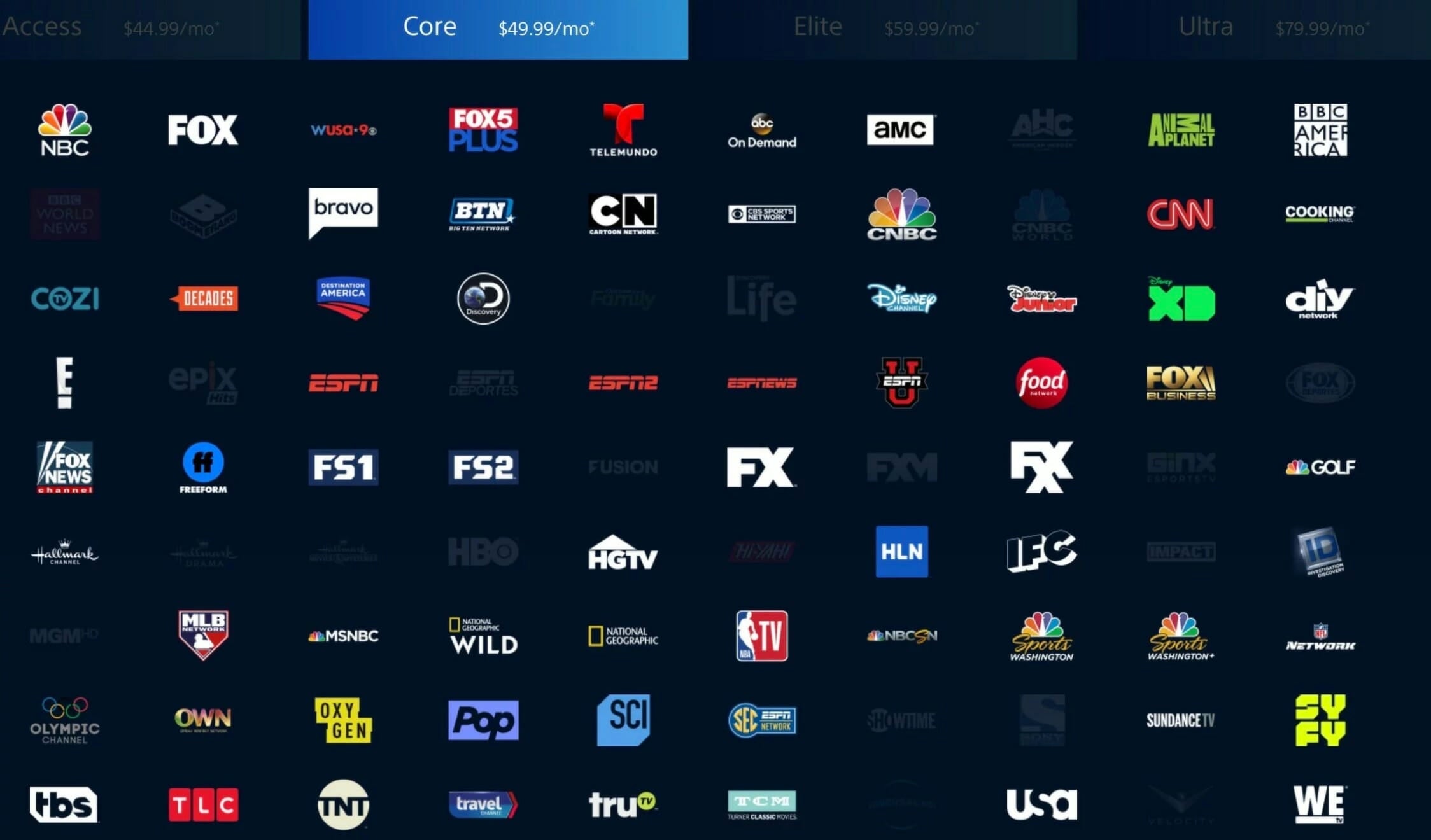
- Cost: $44.99-$79.99 per month (after a 7-day free trial)
- PlayStation Vue devices: PlayStation 3 and 4, Roku, Amazon Fire Stick and Fire TV, Google Chromecast, Kodi, iOS and Android devices
- PlayStation Vue local channels: NBC, Fox, ABC, CBS (enter your ZIP code here to check your availability)
PlayStation Vue is a fantastic option for soccer fans who already own a PlayStation console, but this streaming platform is available on a variety of devices. FS1 and FS2 are part of the Core package of channels that offer soccer and other sports programming, and the options increase at the Elite, and Ultra levels.
4) Hulu with Live TV

- Cost: $44.99 per month (after a 7-day free trial)
- Hulu devices: Roku, Apple TV, Google Chromecast, Amazon Fire Stick and Fire TV, Xbox One, Xbox 360, Nintendo Switch, and iOS and Android devices
- Hulu local channels: ABC, CBS, Fox, NBC, the CW (check your local availability here)
Hulu with Live TV includes sports programming among its broad spectrum of offerings, and as a subscriber to the service, you’ll get free access to Hulu’s sizable on-demand library. (Check out the full list of Hulu Live TV channels.)
5) YouTube TV
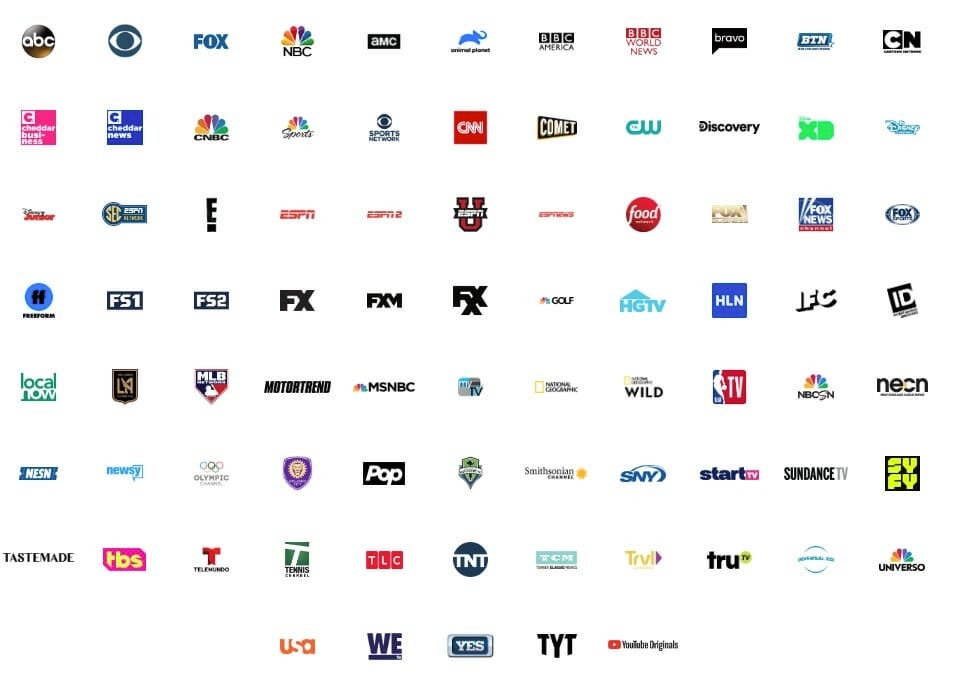
- Cost: $50 per month (after a 7-day free trial)
- YouTube TV devices: Google Chromecast, Roku, Apple TV, Android TV, Xbox One, iOS and Android devices
- YouTube TV local channels: NBC, CBS, Fox, ABC, the CW (enter your ZIP code here to check your availability)
YouTube TV is a great option for soccer fans, including TNT for Champions League matches, NBCSN for Premier League matches, and broadcasting partnerships with three MLS teams. (Take a look at the full list of YouTube TV channels here.)
FIFA Women’s World Cup winners
- 2015: United States
- 2011: Japan
- 2007: Germany
- 2003: Germany
- 1999: United States
- 1995: Norway
- 1991: United States
2019 FIFA Women’s World Cup groups (with FIFA World Rankings)
- Group A: France (4), Korea Republic (14), Norway (12), Nigeria (38)
- Group B: Germany (2), China PR (16), Spain (13), South Africa (49)
- Group C: Australia (6), Italy (15), Brazil (10), Jamaica (53)
- Group D: England (3), Scotland (20), Argentina (37), Japan (7)
- Group E: Canada (5), Cameroon (46), New Zealand (19), Netherlands (8)
- Group F: United States (1), Thailand (34), Chile (39), Sweden (9)
The Daily Dot may receive a payment in connection with purchases of products or services featured in this article. Click here to learn more.

